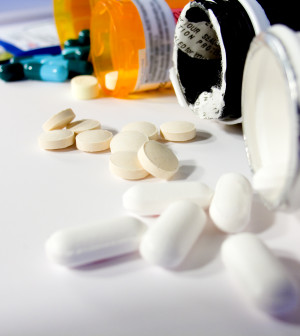- Could Artificial Sweeteners Be Aging the Brain Faster?
- Techniques for Soothing Your Nervous System
- Does the Water in Your House Smell Funny? Here’s Why
- Can a Daily Dose of Apple Cider Vinegar Actually Aid Weight Loss?
- 6 Health Beverages That Can Actually Spike Your Blood Sugar
- Treatment Options for Social Anxiety Disorder
- Understanding the Connection Between Anxiety and Depression
- How Daily Prunes Can Influence Cholesterol and Inflammation
- When to Take B12 for Better Absorption and Energy
- Epsom Salts: Health Benefits and Uses
Health Food Stores Often Promote Adult-Only Supplements to Teens


Health store employees may encourage teens to buy body-shaping dietary supplements, even though the products’ labels state they’re for adult use only, researchers report.
Despite the labeling, it’s legal for minors to buy these over-the-counter products in 49 states. However, the American Academy of Pediatrics says teens younger than 18 should not use the supplements, which are not regulated by the U.S. Food and Drug Administration.
“Adolescents are being enticed by flashy advertisements and promises of quick, body-shaping results,” senior investigator Dr. Ruth Milanaik, of Cohen Children’s Medical Center in New Hyde Park, N.Y., said in a North Shore-Long Island Jewish Health System news release.
“In this body-conscious world, flashy advertising of ‘safe, quick and easy body shaping results’ are very tempting to younger individuals trying to achieve ‘the perfect body.’ It is important for pediatricians, parents, coaches and mentors to stress that healthy eating habits, sleep and daily exercise should be the recipe for a healthy body,” she said.
For the study, testers who identified themselves as 15-year-old boys and girls called 244 health food stores in 49 states to ask about testosterone boosters. In 41 percent of the calls, the store employees said 15-year-olds could buy testosterone boosters on their own.
Nearly 10 percent of the store employees even recommended a specific testosterone booster, according to the study.
“Health food stores that advertise that their employees are ‘trained experts’ need to re-educate their employees and reinforce that these products are not recommended for minors,” Milanaik urged.
The findings were to be presented Sunday at the Pediatric Academic Societies meeting in San Diego. Findings presented at meetings are generally considered preliminary until they’ve been published in a peer-reviewed journal.
More information
The U.S. Center for Complementary and Integrative Health has more about dietary supplements and children and teens.
Source: HealthDay
Copyright © 2026 HealthDay. All rights reserved.










